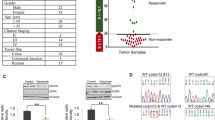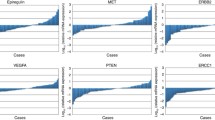Abstract
Purpose
Biomarkers, such as mutant RAS, predict resistance to anti-EGFR therapy in only a proportion of patients, and hence, other predictive biomarkers are needed. The aims were to identify candidate genes upregulated in colorectal cancer cell lines resistant to anti-EGFR monoclonal antibody treatment, to knockdown (KD) these genes in the resistant cell lines to determine if sensitivity to anti-EGFR antibody was restored, and finally to perform a pilot correlative study of EGR1 expression and outcomes in a cohort of metastatic colorectal cancer (mCRC) patients given cetuximab therapy.
Methods
Comparative expression array analysis of resistant cell lines (SW48, COLO-320DM, and SNU-C1) vs sensitive cell lines (LIM1215, CaCo2, and SW948) was performed. The highest up-regulated gene in each resistant cell line was knocked down (KD) using RNA interference, and effect on proliferation was assessed with and without anti-EGFR treatment. Expression of the candidate genes in patients’ tumours treated with cetuximab was assessed by immunohistochemistry; survival analyses were performed comparing high vs low expression.
Results
Genes significantly upregulated in resistant cell lines were EGR1 (early growth response protein 1), HBEGF (heparin-binding epidermal growth factor-like growth factor), and AKT3 (AKT serine/threonine kinase 3). KD of each gene resulted in the respective cells being more sensitive to anti-EGFR treatment, suggesting that the resistant phenotype was reversed. In the pilot study of mCRC patients treated with cetuximab, both median PFS (1.38 months vs 6.79 months; HR 2.77 95% CI 1.2–19.4) and median OS (2.59 months vs 9.82 months; HR 3.0 95% CI 1.3–23.2) were significantly worse for those patients with high EGR1 expression.
Conclusion
High EGR1 expression may be a candidate biomarker of resistance to anti-EGFR therapy.





Similar content being viewed by others
References
Roda D, Cervantes A. Biomarkers in colorectal cancer: the future is getting closer. Clin Transl Oncol. 2010;12(4):241–2. doi:10.1007/s12094-010-0498-4.
Karapetis CS, Khambata-Ford S, Jonker DJ, O’Callaghan CJ, Tu D, Tebbutt NC, et al. K-ras mutations and benefit from cetuximab in advanced colorectal cancer. N Engl J Med. 2008;359(17):1757–65.
Douillard J-Y, Oliner KS, Siena S, Tabernero J, Burkes R, Barugel M, et al. Panitumumab–FOLFOX4 treatment and RAS mutations in colorectal cancer. N Engl J Med. 2013;369(11):1023–34. doi:10.1056/NEJMoa1305275.
Clarke SJ, Karapetis CS, Gibbs P, Pavlakis N, Desai J, Michael M, et al. Overview of biomarkers in metastatic colorectal cancer: tumour, blood and patient-related factors. Crit Rev Oncol/Hematol. 2013;85(2):121–35.
Peeters M, Oliner KS, Parker A, Siena S, Van Cutsem E, Huang J, et al. Massively parallel tumor multigene sequencing to evaluate response to panitumumab in a randomized phase III study of metastatic colorectal cancer. Clin Cancer Res. 2013;19(7):1902–12. doi:10.1158/1078-0432.ccr-12-1913.
Misale S, Di Nicolantonio F, Sartore-Bianchi A, Siena S, Bardelli A. Resistance to anti-EGFR therapy in colorectal cancer: from heterogeneity to convergent evolution. Cancer Discov. 2014;4(11):1269–80. doi:10.1158/2159-8290.CD-14-04622159-8290.CD-14-0462.
Zhou M, Yu P, Hou K, Fu L, Chen Y, Qu J, et al. Effect of RAS status on anti-EGFR monoclonal antibodies +5-FU infusion-based chemotherapy in first-line treatment of metastatic colorectal cancer: a meta-analysis. Meta Gene. 2016;9:110–9. doi:10.1016/j.mgene.2016.05.001.
Pietrantonio F, Petrelli F, Coinu A, Di Bartolomeo M, Borgonovo K, Maggi C, et al. Predictive role of BRAF mutations in patients with advanced colorectal cancer receiving cetuximab and panitumumab: a meta-analysis. Eur J Cancer. 2015;51(5):587–94.
Bronte G, Silvestris N, Castiglia M, Galvano A, Passiglia F, Sortino G, et al. New findings on primary and acquired resistance to anti-EGFR therapy in metastatic colorectal cancer: do all roads lead to RAS? Oncotarget. 2015;6(28):24780–96.
Van Cutsem E, Cervantes A, Adam R, Sobrero A, Van Krieken JH, Aderka D, et al. ESMO consensus guidelines for the management of patients with metastatic colorectal cancer. Ann Oncol. 2016;. doi:10.1093/annonc/mdw235.
Karapetis CS, Jonker D, Daneshmand M, Hanson JE, O’Callaghan CJ, Marginean C, et al. PIK3CA, BRAF, and PTEN status and benefit from cetuximab in the treatment of advanced colorectal cancer—results from NCIC CTG/AGITG CO.17. Clin Cancer Res. 2014;20(3):744–53. doi:10.1158/1078-0432.ccr-13-0606.
Sree Kumar S, Price TJ, Townsend A, Hocking C, Hardingham JE. Predictive biomarkers of response to anti-EGF receptor monoclonal antibody therapies. Colorectal Cancer. 2014;3:223–32.
Siu L, Shapiro J, Jonker D, Karapetis C, Zalcberg J, Simes J et al. Phase III randomized trial of cetuximab (CET) plus either brivanib alaninate (BRIV) or placebo in patients (pts) with metastatic (MET) chemotherapy refractory K-RAS wild-type (WT) colorectal carcinoma (CRC): The NCIC Clinical Trials Group and AGITG CO.20 trial. J Clin Oncol. 2012;30(4 (suppl)):386.
Jhawer M, Goel S, Wilson AJ, Montagna C, Ling YH, Byun DS, et al. PIK3CA mutation/PTEN expression status predicts response of colon cancer cells to the epidermal growth factor receptor inhibitor cetuximab. Cancer Res. 2008;68(6):1953–61.
Miyata K, Yotsumoto F, Nam S, Kuroki M, Miyamoto S. Regulatory mechanisms of the HB-EGF autocrine loop in inflammation, homeostasis, development and cancer. Anticancer Res. 2012;32(6):2347–52.
Topham C, Tighe A, Ly P, Bennett A, Sloss O, Nelson L, et al. MYC is a major determinant of mitotic cell fate. Cancer Cell. 2015;28(1):129–40. doi:10.1016/j.ccell.2015.06.001.
Agarwal E, Brattain MG, Chowdhury S. Cell survival and metastasis regulation by Akt signalling in colorectal cancer. Cell Signal. 2013;25(8):1711–9. doi:10.1016/j.cellsig.2013.03.025.
Mahalingam D, Natoni A, Keane M, Samali A, Szegezdi E. Early growth response-1 is a regulator of DR5-induced apoptosis in colon cancer cells. Br J Cancer. 2010;102(4):754–64. doi:http://www.nature.com/bjc/journal/v102/n4/suppinfo/6605545s1.html.
Hong Y, Ho KS, Eu KW, Cheah PY. A susceptibility gene set for early onset colorectal cancer that integrates diverse signaling pathways: implication for tumorigenesis. Clin Cancer Res. 2007;13(4):1107–14. doi:10.1158/1078-0432.CCR-06-1633.
Song LJ, Liu RJ, Zeng Z, Alper SL, Cui HJ, Lu Y et al. Gastrin inhibits a novel, pathological colon cancer signaling pathway involving EGR1, AE2, and P-ERK. J Mol Med (Berlin, Germany). 2012;90(6):707–18. doi:10.1007/s00109-011-0851-2.
Scaltriti M, Baselga J. The epidermal growth factor receptor pathway: a model for targeted therapy. Clin Cancer Res. 2006;12(18):5268–72. doi:10.1158/1078-0432.ccr-05-1554.
Kavuri SM, Jain N, Galimi F, Cottino F, Leto SM, Migliardi G, et al. HER2 activating mutations are targets for colorectal cancer treatment. Cancer Discov. 2015;5(8):832–41. doi:10.1158/2159-8290.cd-14-1211.
Cushman SM, Jiang C, Hatch AJ, Shterev I, Sibley AB, Niedzwiecki D, et al. Gene expression markers of efficacy and resistance to cetuximab treatment in metastatic colorectal cancer: results from CALGB 80203 (alliance). Clin Cancer Res. 2015;21(5):1078–86. doi:10.1158/1078-0432.CCR-14-2313.
Bigatto V, De Bacco F, Casanova E, Reato G, Lanzetti L, Isella C, et al. TNF-α promotes invasive growth through the MET signaling pathway. Mol Oncol. 2015;9(2):377–88. doi:10.1016/j.molonc.2014.09.002.
Zwang Y, Oren M, Yarden Y. Consistency test of the cell cycle: roles for p53 and EGR1. Cancer Res. 2012;72(5):1051–4. doi:10.1158/0008-5472.can-11-3382.
Author information
Authors and Affiliations
Corresponding author
Ethics declarations
Grant funding
Grant funding was received from the Cancer Council of South Australia (APP1028595).
Conflict of interest
Professor Timothy Price is an advisory board member of Amgen and Merck; no other conflicts of interest to report.
Ethical standards
All studies using human tissue have been approved by the ethics committee of The Queen Elizabeth Hospital under the governance of the Central Adelaide Local Health Network and have been performed in accordance with the ethical standards laid down in the 1964 Declaration of Helsinki and its later amendments.
Electronic supplementary material
Below is the link to the electronic supplementary material.
Rights and permissions
About this article
Cite this article
Kumar, S.S., Tomita, Y., Wrin, J. et al. High early growth response 1 (EGR1) expression correlates with resistance to anti-EGFR treatment in vitro and with poorer outcome in metastatic colorectal cancer patients treated with cetuximab. Clin Transl Oncol 19, 718–726 (2017). https://doi.org/10.1007/s12094-016-1596-8
Received:
Accepted:
Published:
Issue Date:
DOI: https://doi.org/10.1007/s12094-016-1596-8




